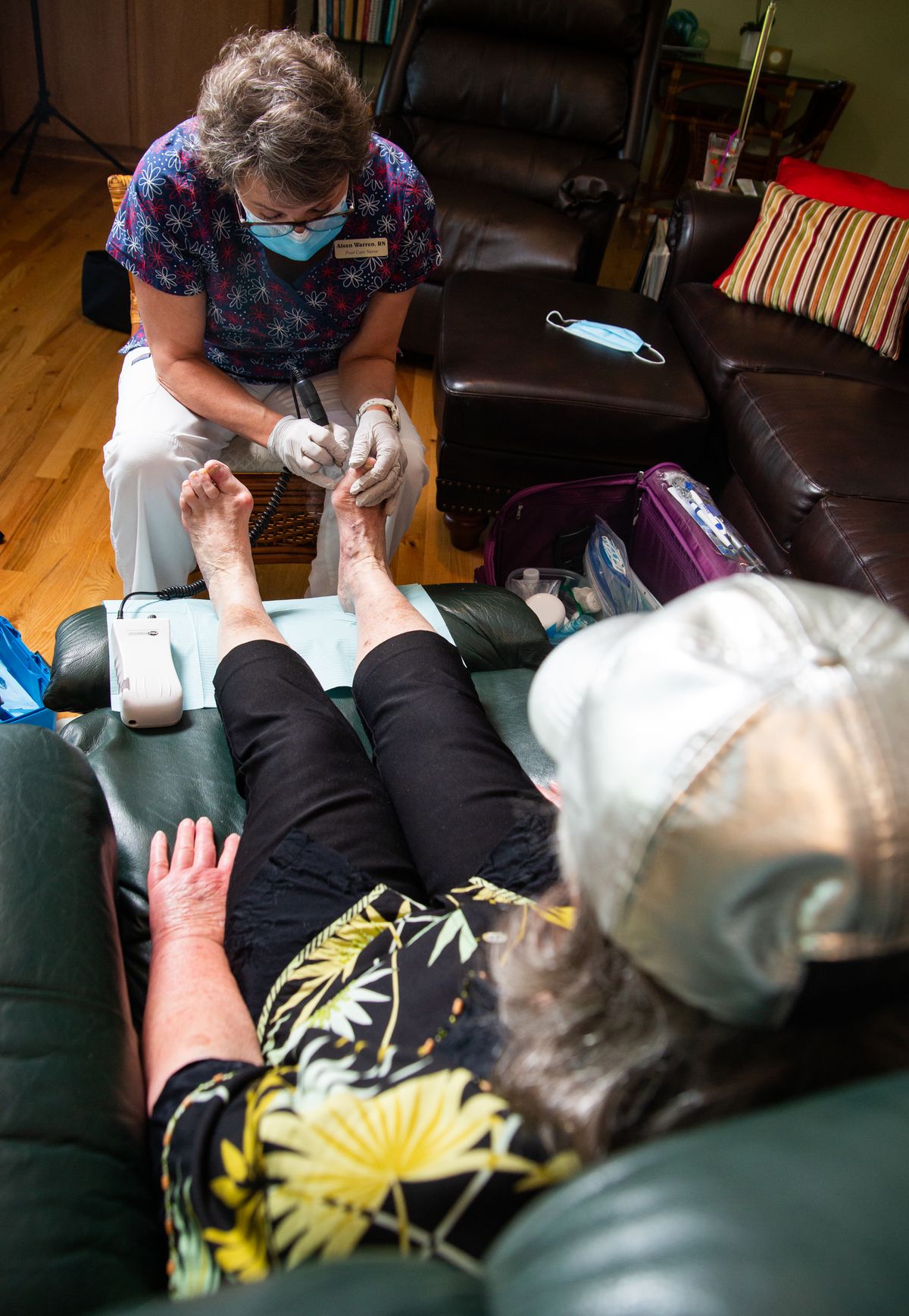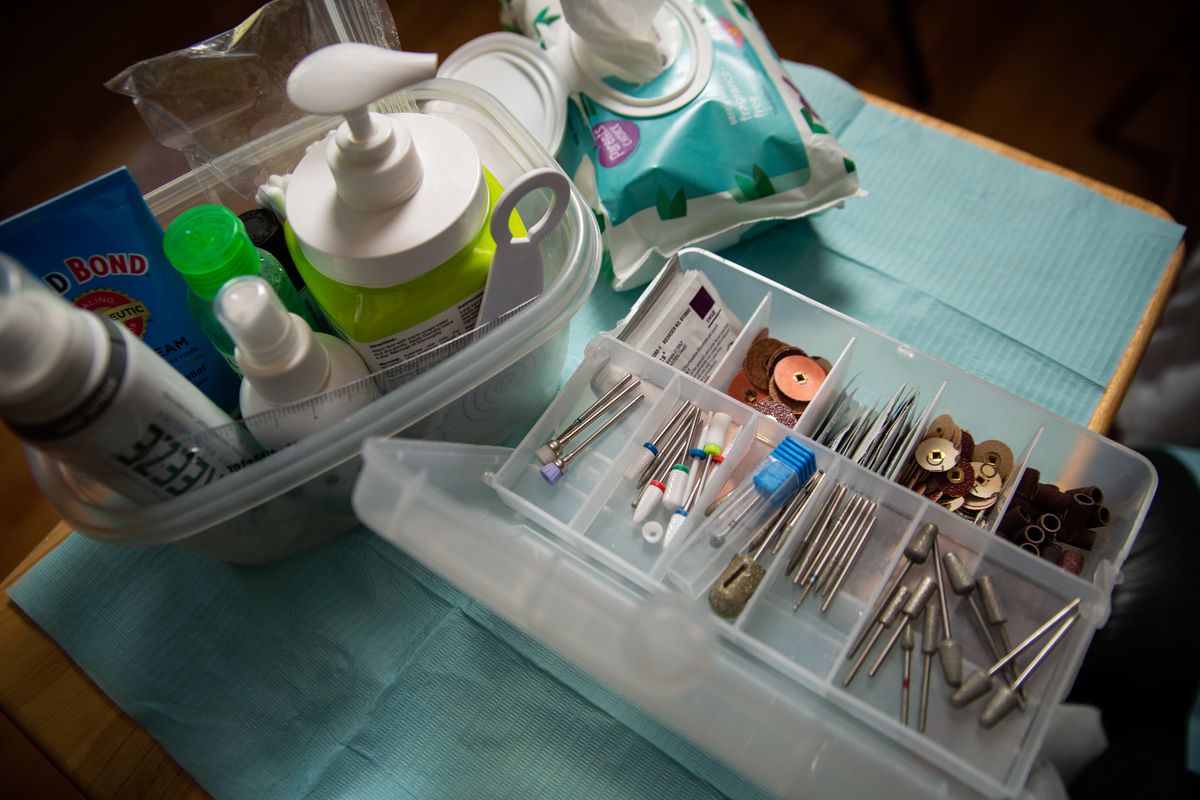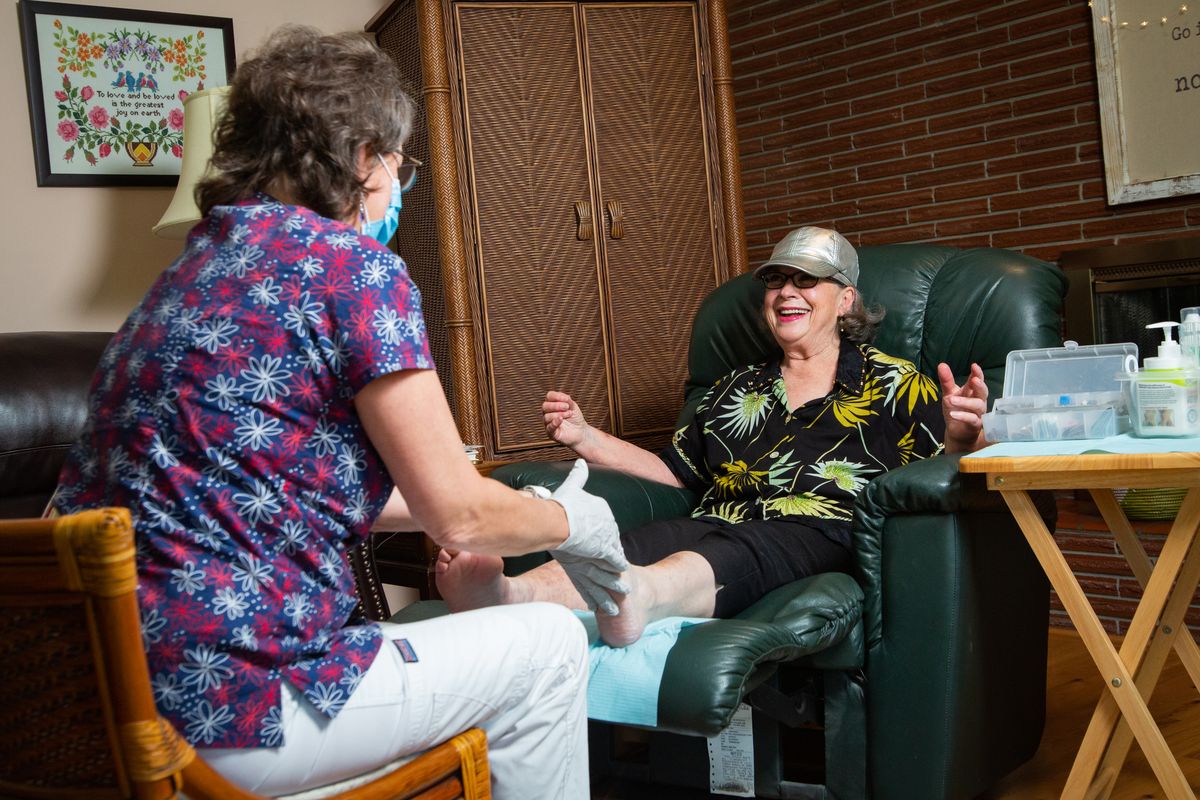Best foot forward: Medical-grade foot care by nurses keeps patients in step with health
A look into a portion of the kit that Aleen Warren uses for her Feet First Spokane medical-grade foot care service on June 21, 2021 at the home of Val Hughes, one of her clients. Warren is a registered nurse who conducts in-home treatments for clients who need relief for their feet, and uses proper sterilization and disinfection protocols and medical techniques to improve her clients' sensation and mobility. (Libby Kamrowski/ THE SPOKESMAN-REVIEW)Buy a print of this photo
Toe-level health has gained recent strides thanks to nurses trained in what’s called medical-grade foot care. It’s eased foot pain for Spokane’s Val Hughes, 74, a retired nurse who learned of the service four months ago.
She’s long had orthopedic issues with feet, suffering from years of standing at work and as a singer on stage. Then her toenails became unruly. “After years and years of standing as a scrub nurse and standing as a musician singing, my feet, which started out not so terrible, turned into ruckus, horrid feet,” Hughes said.
A fungus didn’t help, causing the nail to thicken and create pressure against shoes. “I never had trouble with my toenails until I married my wonderful, sweet husband, and then he sort of shared his toes with my toes,” she said.
A cousin told her about receiving care at Rockwood South Hill from Aleen Warren, a nurse with the mobile service Feet First Spokane, so Hughes requested a home visit. “The best part of her care is now my feet feel so much less pain, so I can resume my brisk walking for exercise,” Hughes said.
“It’s so heartwarming to stand up on the floor and actually feel the surface of the bottom of my feet on the floor instead of coasting along on calluses. There was none of the fancy, schmancy putting on of nail polish.
“It’s all about taking care of toenails that are too hard to reach at this age, too thick to cut with my instruments at home and too exhausting to have to file, so she takes care of my toenails, of the calluses that surround the feet and of letting you know about things that can be ordered (in self-care).”
Many nurses have opened independent, mobile businesses after training with the American Foot Care Nurses Association on how to examine the feet, skin and circulation and use sterilized medical-grade equipment for the care of calluses, thick toenails, blisters, corns, ingrown toenails and cracked heels.
Spokane has about 12 such foot care providers, many trained by Dr. Julia Overstreet, a Bellevue podiatrist of more than 30 years and the association’s founder. The practitioners learn to identify and care for common foot problems, nail changes and foot disorders among diabetic and geriatric patients.
They also educate about shoes and self-care, and their equipment includes medical sanders, nail nippers and files. A patient’s treatment of about 45 minutes happens on average once every two months, Overstreet said.
She started training a few nurses at their request 15 years ago, and demand grew. A new trend is that more health care systems are having staff undergo AFCNA education, from Veterans Affairs hospitals to Kaiser Permanente, she said. The service can benefit older adults, people with poor vision and disabled patients.
Nurses become a first line of defense against issues, Overstreet said. During a routine doctor’s visit, patients’ feet aren’t always examined. “Nurses have medical training, and we enhance that with lower-extremity physical exam teaching,” Overstreet said.
“They look for areas that are rubbing or could become an open sore, for infections and other problems. Diabetes, for instance, sometimes affects people’s nerves, and they don’t feel their feet, so they don’t know sometimes if they have an injury or are getting an infection. … It can stop an amputation from happening.”
If issues are found, nurses refer people to a primary doctor or podiatrist. “They also are trained to do the nails and calluses in a very safe way, not necessarily cosmetic. We thin and shorten nails. We teach them to work on the sides of the nails in such a way that they’re not likely to get ingrown or infected.”
Nurse Kim West calls the work medically essential foot care. She has operated her mobile Gentle Touch Foot Care Services in Spokane for eight years. “You’ve got difficult toenails, diabetics, skin conditions, foot and toe deformities, calluses and all sorts of skin disturbances,” West said.
“With diabetics, the condition can affect circulation and microcirculation. It’s a big, long story, but it comes down to if they get a wound on their foot, then is their microcirculation going to be able to heal them?
“We have to be careful with the tools and the disinfection of the tools and that we can assess the skin, is it safe to trim those nails or not and do proper education for foot care.”
Most private insurance companies don’t cover the sessions, Overstreet said. Nurses charge $45 to $75 depending on the region. If the medical-grade foot care is ordered by a podiatrist or other primary care physician, Medicare often does cover the charge, Overstreet said.
Feet First Spokane’s Aleen Warren said this region’s rate is about $50 to $65 per session. A nurse for 12 years, she runs her service part time. Many clients are ages 85 and older, including at Rockwood. With five years in foot care, she moved from Bellingham to Spokane two years ago.
In her previous job at a senior clinic, “there were just so many foot problems,” Warren said. “Yet in the world of health, it’s all about staying active. I would think, how are these seniors going to keep moving when their feet are like this?
“They hurt, they’ve got toenails growing in different directions and that are uncomfortable in their shoes. Many of them are wearing the wrong style and size of shoe.”
Staying mobile is integral to keeping strength, endurance and balance, she said. Warren heard about Overstreet for initial clinic training, then on her own completed advanced education “because I saw it was making a difference for seniors. Many people cannot reach their feet.
“They can’t see as well to notice a change. Many people get arthritis, especially in their hands, so it’s hard to hold the fine tools to do your feet. It’s hard when your nails get very thick, and you get big calluses. They can’t even get the clippers through the nail.
“And the only way I can is I sand them down first, then clip them. It’s not so much that everybody I work with is disabled as much as they are less able to due to aging.”
Humans aren’t anatomically designed to reach toenails easily for extensive care, she said. Add back or hip issues, weight gain or arthritis, and it’s more difficult. “Having a nurse sit at your feet, I’m at a great angle from the other side of things,” she said.
For Hughes, it’s a relief in ways beyond easing foot pain. “I feel safe under her care,” Hughes said. “She does a dry technique simply working with her little Dremel and an assortment of things handheld.”
“To have someone who can actually see my toes and the underside of my feet and be aware if there are any conditions that need looking at by a physician, that’s great.”
Foot care providers can be found with a search on the website afcna.org and by inquiring at podiatrists’ offices and primary care clinics.




